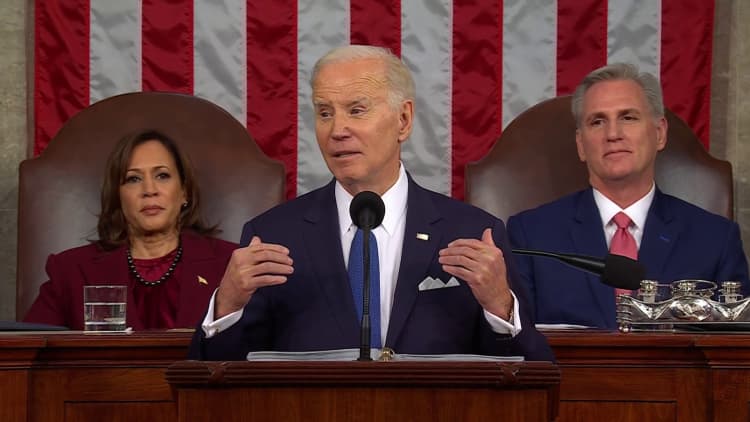Why millionaires may have already hit their Social Security payroll tax limit for 2024

Ezra Bailey | Getty Images
Most Americans can expect to pay Social Security payroll taxes throughout 2024.
But for top earners with gross annual wage income of $1 million, March 2 marks the date at which they will stop paying into the program, according to the Center for Economic and Policy Research.
The reason why those higher earners stop paying into the program a little more than two months into 2024 can be explained by the taxable maximum: the limit on earnings that are subject to the Social Security payroll tax.
In 2024, that threshold is $168,600. Therefore, workers with wages equal to, or larger than, that amount stop paying into the program once they reach that point.
How the Social Security payroll taxes work
Social Security payroll taxes require workers to contribute 6.2% of their pay to Social Security, which is matched by their employer.
Those who are taxed on the full $168,600 threshold will pay $10,453.20 to the program in 2024, with their employer also paying that same amount, according to the Social Security Administration.
More from Personal Finance:
78% of near-retirees failed or barely passed a basic Social Security quiz
Why Social Security beneficiaries may owe more taxes on benefits
62% of adults 50 and over have not used professional help for retirement
The taxable maximum is adjusted each year based on changes in the national average wage index. The portion of workers earning more than the taxable maximum has been around 6% since the 1980s, according to the Bipartisan Policy Center.
Yet, the percentage of total national earnings above the taxable maximum has increased, since income for top earners has grown faster than average wages, the Bipartisan Policy Center found. In 1977, the taxable maximum covered 90% of total national earnings. As of 2022, that had decreased to 82%.
Social Security faces a looming funding shortfall. Without action from Congress, the program may only pay full benefits until 2034, at which point there will be a benefit cut of at least 20%, according to the program’s trustees.
To fix that, Congress may choose to raise taxes, cut benefits or a combination of both.
How Congress may raise taxes on the wealthy
A recent Data for Progress poll finds 71% of all voters — Democrats, Republicans and independents — would prefer that Congress address the Social Security shortfall by raising taxes on wealthy Americans.
Democrats on Capitol Hill have proposed requiring the wealthy to pay more into the program.
That includes the Social Security 2100 Act — led by Rep. John Larson, D-Conn., with 183 Democrat co-sponsors in the House — that would reapply the payroll tax on those making more than $400,000 per year, as well as tax unearned investment income.
Sens. Elizabeth Warren, D-Mass., and Bernie Sanders, I-Vt., are also leading a proposal that would make income more than $250,000 subject to the Social Security payroll tax, while also applying a 12.4% tax to business and investment income.

The Democrats’ proposals would notably make benefits more generous while extending the program’s solvency.
“The revenue that it produces is substantial,” Larson said of his proposal to lift the cap on the Social Security payroll tax for high earners making more than $400,000, in keeping with President Joe Biden’s pledge not to impose new taxes for people under that threshold.
The tax increase would affect a smaller segment of wealthy Americans, while making it possible to enhance benefits for the first time in 50 years, Larson said.
“Every town hall I have I usually start off by saying, ‘Well, first of all, raise your hand if you’re making more than $400,000,'” Larson said. “I’ve yet to have a hand go up in any room that I’ve been in.”
In order for Congress to raise payroll taxes, Republicans would also have to approve the change, which would be a “difficult ask,” notes Emerson Sprick, associate director of economic policy at the Bipartisan Policy Center.
Some wealthy Americans willing to pay more
Some wealthy Americans — such as former BlackRock managing director Morris Pearl, who serves as chair of the board of the Patriotic Millionaires, a group of high-net-worth Americans — agree they should pay higher taxes.
While working at BlackRock, Pearl remembers only paying into Social Security in his initial paychecks of the year.
Now he lives mostly on investment income, which is subject to lower tax rates and not taxed for Social Security.
That investment income is subject to capital gains and only taxed when realized. Those capital gains tax rates are lower than those for income produced from working, he noted.
“People like me who get investment income should pay at least the same tax rates as people who work for a living,” Pearl said. “There’s actually no justification. I’m paying a lower tax rate than people who actually work all day.”
Patriotic Millionaires is advocating for people who make more money to pay higher tax rates than people who make less money, he said. The group includes more than 200 high-net-worth individuals.
Don’t miss these stories from CNBC PRO:
Share this news on your Fb,Twitter and Whatsapp
Times News Network:Latest News Headlines
Times News Network||Health||